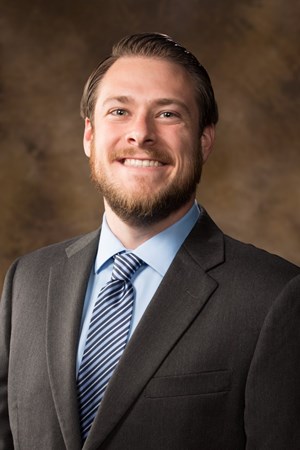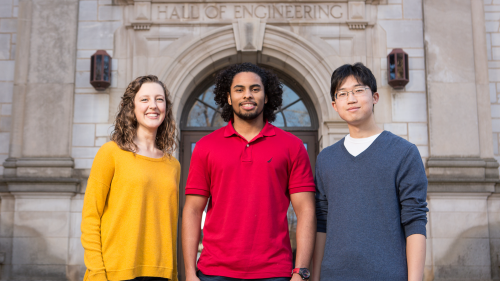German
Our German program offers solid career opportunities, and we encourage our students to not only study abroad but also work and research abroad. The International Engineering Program allows students to earn both a BS in engineering and a WLLC BA in German in just five years, spending their fourth year abroad studying abroad and working at a German company.
In addition to traditional courses on German language and literature, we teach innovative courses aligned with faculty research that allow students to explore individual topics in greater detail such as: the German Graphic Novel, Professional German, German Cinema, Migration and National Identity, and Germany and the Holocaust: The Significance of the Holocaust in Differentiated Contexts.
How is German important today?
German is the most widely spoken language in Europe, and Germany has a long history as a high tech center that continues today. The nation is a leader in multiple fields of business and STEM, such as the automotive, biotechnology, alternative energy, pharmaceuticals, and computer science sectors, and the German economy drives the European Union.
German additionally gives you access to the rich, world-renowned cultural achievements of the German-speaking countries—contributions by names such as Mozart, Bach, Beethoven, Klimt, Goethe, Kafka, Marx, Nietzsche, and Freud are among those you might recognize. German Americans are the largest heritage group in the US. Kindergarten, Christmas trees, and Levi jeans were all introduced by German-Americans.
 Brett E Sterling
Brett E Sterling
Program Director
Meet our German instructors and TAs in our departmental directory.
Unique Aspects of our German Program

The International Engineering Program (IEP) gives students the opportunity to earn two degrees in five years—a BS in engineering and a WLLC BA in German. It is open to students in all fields of engineering. Students spend their fourth year studying abroad for a semester at the Technische Universität Darmstadt (Technical University of Darmstadt) followed by a paid internship with a German company. Interested students should review this page on the College of Engineering website for more information and application instructions.
The Arkansas Iota Xi chapter of the National German Honors Society, Delta Phi Alpha, was established in 1983. We have held an annual initiation every year since, and
our membership now includes over 500 members, making us one of the most active chapters in the country. Students must have an overall B- average, a B+ average in German, be of sophomore
standing or above, and have taken at least one junior level class. Members receive
honors cords to wear at graduation, and several U of A students have received study
abroad scholarships from the organization.
Students who are studying in the Walton College of Business, the College of Engineering,
the College of Education and Health Professions, the Bumpers College of Agricultural,
Food, and Life Sciences, and the Jones School of Architecture have another option
available known as the additional major (AMGERM). It allows students to add German
as an additional major by completing the 24 hours of upper level coursework (3000-5000
level classes) without having to take the other major requirements for the traditional
major. So, for example, this makes it easy for students to double major in German and business, German and engineering, German and hospitality, etc.












Professional & Academic Opportunities for German Speakers
RISE is an excellent opportunity for students in biology, chemistry, physics, earth sciences and engineering to work in paid summer positions in German doctoral laboratories. A part of the DAAD (Deutscher Akademischer Austauschdienst, German Academic Exchange Service), this program is extremely competitive and open to students in all of North America and Great Britain. U of A students have done very well in this competition.
The main factors in success are a high GPA and strong letters written by professors with whom the student has conducted laboratory research. Students must be sophomores to apply. Positions are available all over Germany and vary in length from six weeks to three months. German is not required since the language of the labs is English, but since students live in cities in which not all citizens can or want to speak English, at least two semesters of German are recommended. Students who have taken at least four semesters of German before participating in this program are eligible to earn three hours of conversation credit by Credit by Examination; see Dr. Condray (condray@uark.edu) for details.
U of A German students have completed internships at firms as diverse as BMW, Mercedes, and SpaceX (engineering), a start-up in Berlin (business), a medieval hotel (hospitality), and a design firm in Leipzig (architecture). See Dr. Condray (condray@uark.edu) to get started on your search, and be sure to attend the annual German Careers event, announced in German classes in the fall, to discover different career paths and learn what you need to do now to secure a job later. Also consider taking Professional German (GERM 4333), in which students create resumes and participate in mock interviews in German as well as completing multiple projects to help them learn the vocabulary and culture of the working world in German-speaking Europe.
For more information, please visit this page.
For a list of courses, please visit DAAD's website here.
Read more about programs in Germany.
Read more about programs in Austria.
Interested in studying German at the U of A?
Are you continuing your investment in learning German after starting in high school?
We do not offer a placement exam, since we’ve found that an hour exam is insufficient to capture what students have learned over years. The general rule of thumb is one year of high school is equal to one semester of college German. So, if you’ve had:
- one year of high school German, start in GERM 1013 (Elementary II).
- two years of high school German, start in GERM 2003 (Intermediate I).
- three years of high school German, start in GERM 2013 (Intermediate II).
- four or more years of high school German, start in GERM 3003 (Advanced I).
You can earn free retroactive credit by starting at a higher level than GERM 1003 (Elementary I), as long as you earn a C or better in the class. This is called Credit by Achievement. If you take GERM 3003, you could take one course for three hours and potentially earn fifteen hours (because you would get credit for 3003, as well as the courses you skipped over: 2013, 2003, 1013, and 1003).
However, we understand that language learning during the pandemic was sometimes less than optimal, and these are guidelines—you are welcome to start at a lower level if you feel more comfortable with a review starting out, and if you’re just not sure, please send an email to condray@uark.edu to discuss which level is best for you.
Are you new to learning German?
The place for you to start is GERM 1003 (Elementary German I). This is the course for true beginners, starting with the alphabet. We’ll give you a solid foundation in the basics that will help you build your linguistic skills in reading, writing, speaking, and listening as you move forward.
Have questions / need an override / want to chat?
Contact the undergraduate advisor, Dr. Kathleen Condray, at condray@uark.edu. If you have questions about which level you should take, Dr. Condray is happy to meet via Zoom over the summer—please do not hesitate to reach out! Send an email with your availability to set up an appointment. Once the semester starts, Dr. Condray is available in office hours to talk about study + work abroad, career opportunities, and all things German. Appointments can also be made for those who have class during office hours.
